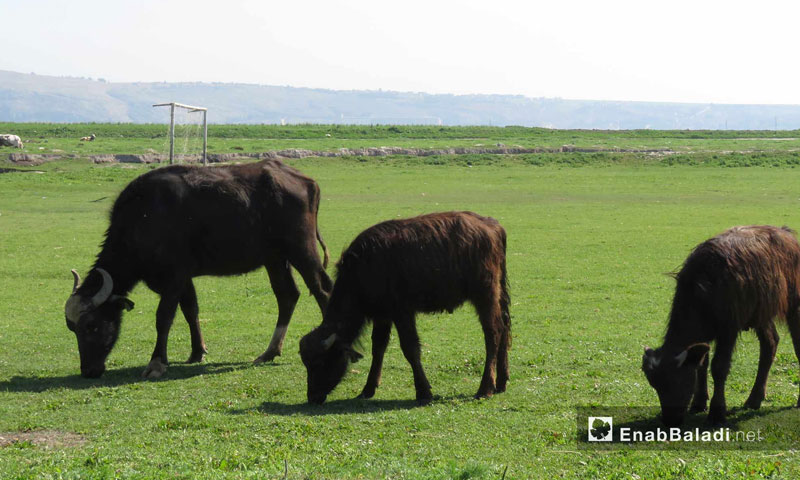The northern countryside of Hama is suffering an almost daily shelling, which in the past a few weeks has targeted the agricultural lands during the harvest season, setting the lands on fire and causing the farmers a massive loss.
The targeted area expands from the two towns of al-Lataminah and Kafr Zita, arriving at the town of Kafr Nabudah.
Engineer Ali al-Hawari, the director of the agricultural office of the al-Lataminah Local Council, told Enab Baladi that regime’s checkpoints located in the two cities of Halfaya, Mahardah, and the two checkpoints in Zalin and Masasneh have all targeted the agricultural lands with mortar shells and napalm firebombs.
The bombing has burned large areas of wheat and barley, in addition to the grass that fills the land between the trees of olive and pistachio. The total space of the affected agricultural lands is 39 hectares, 30 hectares of wheat planted areas and ten planted with barley. As for the financial loss, it is estimated with a sum that exceeded 45 thousand dollars.
Al-Hawari pointed out that this was not the first season, during which the harvest is burned due to shelling, as four former successive seasons suffered fires during the harvest time.
In the past two months’ shelling, ten people were killed, and 16 others were injured in the city of al-Lataminah; other two deaths took place in the lands affiliated to the Arbain town and another in the agricultural lands of Kafr Zita.
Al-Hawari appealed to the Hama Governorate Council and the concerned organizations and entities as to offer financial and moral support to the farmers, to compensate for their loss, even if partially.
The media activist Basel al-Hamwi said that the northern countryside of Hama is suffering a “violent military campaign” by Assad’s forces, especially with the beginning of the harvest season, which is the civilians’ only source of living.
The crops are targeted and completely burned in front of the Turkish monitoring point located in the eastern part of Murak; this poses a threat to the whole season, if Assad’s forces were to continue with their campaign against the farmers, according to al-Hamwi.
Ahmad al-Omar, a farmer from the area, has planted over ten dunums of wheat, which cost him about 300 thousand Syrian pounds. With the approach of the harvest season, the field was completely burned for being a direct target to shelling with heavy artillery. When both his car and house were destroyed, al-Omar had no other way to make a living but his now burned land and the crops it was supposed to give him.
Identical sources from the area, told Enab Baladi, on May 6, that a “truce” has started a few days ago, in coordination with a Turkish officer in the eighth monitoring point fixed by the Turkish army in the city of Murak, northern Hama, last April.
Enab Baladi managed to get a copy of a statement, made by farmers from the area, saying that the “truce” happened thanks to the efforts made by Sheikh Metaab al-Bablat, “Amar Observatory” and in coordination with al-“Sham Legion,” which contacted the Turks at the Murak point. The communication resulted in a “truce” that will last for a season, a month that can be renewed.
The truce covers the towns and villages of the al-Tamanah, Sukayk, Farja, al-Zarzor, al-Khwain, Umm Elkhalayel, Umm Jalal, Msheirfeh, in addition to Tell Khaznah, al-Luwaybidah, Sahal, al-Tina, Tell Dam and Abu Sharhah.
However, the shelling persisted with the same violence after the declaration of the truce.
These towns and villages are adjacent to areas controlled by Assad’s forces, which achieved a major progress late in 2017, within the frame of the battles against the opposition.
The shelling corresponds to the beginning of the cumin harvest date, separated by ten days from anise, chickpeas, fennel and wheat harvesting time.

